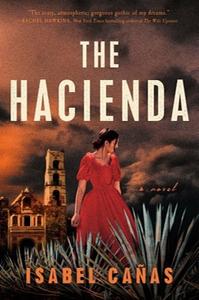.jpg)
|
|
| photo: Kilian Blum | |
Isabel Cañas is a Mexican-American speculative fiction writer. After living in Mexico, Scotland, Egypt and Turkey, among other places, she has settled (for now) in New York City, where she is working on her Ph.D. dissertation in medieval Islamic literature and writes fiction inspired by her research and her heritage. The Hacienda (Berkley, May 3, 2022) is her debut novel, a dark gothic set in the 19th-century Mexican countryside, with a house haunted by more than just the supernatural.
Handsell readers your book in about 25 words:
When new bride Beatriz moves into her widower husband's profoundly haunted estate, she must rely on a local priest's dark secrets and her own wits to survive the hacienda's malicious spirits.
On your nightstand now:
An ARC of Book Lovers by Emily Henry. Reading romance kept me sane as I trudged through the final leg of writing my Ph.D. dissertation. Matrix by Lauren Groff, which is incredible, languishes next to my e-reader. I have picked it up and put it down several times, because literary fiction does not mix well with my poor, burned-out, post-dissertation brain. I found the first few books of the Mediator series by Meg Cabot in a used bookstore while on vacation and picked them up for an indulgent high school throwback. And I'm savoring an early copy of House of Hunger by Alexis Henderson, a gloriously dark and atmospheric sophomore novel that I predicted--just from hearing the pitch!--would swallow me whole. Reader, I was absolutely right. Put House of Hunger on your TBR pile yesterday.
Favorite book when you were a child:
Mara, Daughter of the Nile by Eloise Jarvis McGraw was the first novel I read where the heroine's bilingualism was her superpower. I was a young reader who struggled with the transition from learning how to read and write in Spanish in Mexico to elementary school in the U.S. Even when I received conflicting messages about language from the world around me, Mara empowered me to take pride in my own ability to speak two languages.
Your top five authors:
Leigh Bardugo, Holly Black, Laini Taylor, Roshani Chokshi and S.A. Chakraborty. The first four became well-known for their young adult novels; I came of age as a writer in the YA space and learned so much about plot, atmosphere, economy of language and pacing from their novels. Chakraborty achieves with flying colors what I strive to do with my writing: she takes history and spins it golden with wonder. I adore her work.
Book you've faked reading:
Every academic has a list of books they've faked reading for a graduate seminar, a class they taught or their dissertation. My list comes with me to the grave!
 Book you're an evangelist for:
Book you're an evangelist for:
Strange the Dreamer by Laini Taylor breaks every writing rule you've ever heard of and is a glorious, compassionate triumph of fantasy literature that grapples with a timeless question: Are forgiveness and reconciliation possible in the aftermath of a devastating war?
Book you've bought for the cover:
The Mirror Season by Anna-Marie McLemore. McLemore's novels are an auto-buy for me for their lyricism, their effortless magical realism and their heartwarming (and heartbreaking) queer themes. The Mirror Season did not disappoint on any of these fronts. It is very precious to me.
Book you hid from your parents:
Miraculously, I found Tithe by Holly Black on the shelf of the library of my extremely conservative Catholic high school. I smuggled it home and devoured it in secret. I think I guessed that even my more enlightened parent would have had her feathers ruffled by a 14-year-old reading a YA novel with such a dark cover and even darker themes.
Book that changed your life:
The Brief Wondrous Life of Oscar Wao by Junot Díaz. I don't make this choice lightly, as I no longer read Díaz. When I picked up this novel at the age of 21, I was certain I wanted to be a writer but was unmoved by the literary fiction I thought I should be reading and writing. In Oscar Wao, I encountered a portrayal of a Latinx character obsessed with writing a fantasy novel. Every Latin American or U.S.-based Latine writer I had ever encountered in print wrote literary fiction or magical realism, so I thought I had to as well. That was the first time that I realized, whoa, I'm allowed to be Latina and write genre? I started writing my first fantasy novel that year and haven't stopped writing genre since. Representation matters.
Favorite line from a book:
"Barrabas came to us by sea, the child Clara wrote in her delicate calligraphy." --Isabel Allende, The House of the Spirits
Five books you'll never part with:
Strange the Dreamer for the aforementioned reasons.
A used copy I found of Isabel Allende's The House of the Spirits that looks exactly like my mom's original, well-loved and extremely beat-up paperback edition.
In Orhan Pamuk's The Museum of Innocence, there is a ticket to visit the author's museum in Istanbul for free. I used it. When I got my book signed by Pamuk, I asked him to sign that page. He laughed and obliged.
My heavily annotated copy of Story Genius by Lisa Cron, which revolutionized how I approach plot and character.
And the Redhouse Ottoman Turkish dictionary that shepherded me through graduate school.
Book you most want to read again for the first time:
Leigh Bardugo's Six of Crows. I was told it was an excellent book to study for craft, but I did not expect to be swept away so thoroughly. Bardugo's mastery of voice, plot and world-building are unparalleled; this is the closest you get to perfection in young adult fantasy literature.

